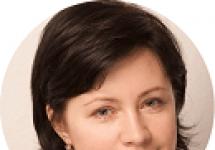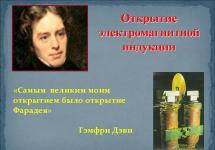1 slide

2 slide

3 slide
V.Ya.Bryusov is one of the brightest representatives of the Silver Age. Literary critic, translator, literary historian, Pushkin scholar, poet. V. Bryusov was born on December 1, 1873 in Moscow into a wealthy merchant family. He grew up as a lively, inquisitive child and learned to read at the age of four. From a young age I listened to conversations about “ smart things", read books of scientific content. Knowledge beyond his years awakened in him the dream of “becoming great.” I started composing early. Already in the gymnasium he recognized himself as a poet.

4 slide
Acquaintance with the poetry of the French symbolists Verlaine and Rimbaud became “a complete revelation” for Bryusov. Young Bryusov is thinking about becoming a poet; he wants to be the leader of Russian poetry. Respecting Pushkin, he understands that he can express his attitude towards the end of the century only through symbolism. Bryusov considered the goal to create a new poetic school in Russia, and the task of symbolism was to refine and refine poetic means in order to better express the complex world of his contemporary.

5 slide
To the young poet. Pale young man, with a burning gaze, Now I give you three covenants. First accept: do not live in the present, Only the future is the domain of the poet. Remember the second thing: don’t sympathize with anyone, love yourself infinitely. Keep the third: worship art, only it thoughtlessly, aimlessly. A pale young man with a confused look! If you accept my three covenants, I will silently fall as a defeated fighter, Knowing that I will leave the poet in the world. 1896

6 slide
In 1894-1895 Three issues of “Russian Symbolists” were published. The compiler and author of most of the poems was V. Bryusov. He is 20 years old. He is a student at Moscow University. In “Russian Symbolists” Bryusov intended to give readers everything possible samples poetry of symbolism. He was looking for new poetic forms and impressions.

7 slide
Creation. The shadow of uncreated creatures sways in a dream, Like patching blades On an enamel wall. Violet hands On the enamel wall Half-asleeply they draw sounds In the ringing silence. And transparent kiosks, In the ringing silence, Grow like sparkles, Under the azure moon. The naked month enters Under the azure moon... The sounds soar half asleep, The sound caresses me. The secrets of created creatures caress me with affection, And the shadow of patches trembles on the enamel wall. 1895

8 slide
In the 90s, Bryusov published the first collections of his poems, which attracted attention with titles (“Masterpieces”, “This is Me”) of a shocking (scandal-causing) nature. The early poems were dominated by exotic images, motifs of openly sensual love, and creative fantasy. The poet paid great attention to formal experimentation and improving the technical skills of versification. In 1900 it comes out A new book Bryusov "The Third Watch". This book became an event in literature. “For the first time, in reviews of this book, I was treated like a poet,” wrote Bryusov. “The Third Watch” is a book of two levels: the poet illuminates the past of humanity through the faces of various heroes (“Favorites of the Ages”) and talks about modernity (“I love big houses”). In this same book, the theme of Time arises acutely. Bryusov's premonitions are gloomy. In the poem “In the Days of Desolation,” he sees the present as a huge building in shaky scaffolding.

Slide 9
A phenomenon of reality that connects the past and the present. It became the image of the city for Bryusov. The 1903 collection “The City and the World” shows the ambiguity of attitudes towards this image. On the one hand, the glorification of cultural and material values, on the other, horror of the destructive power of invisible monsters, ugly reality, the struggle of “the city with the people.” Bryusov unconditionally supported the October Revolution, plunged headlong into community service. He did a great job of preserving private libraries and estates. Despite all his busyness, he did not stop writing poetry. The poem “Work” became a program in the first years of Soviet power. In 1920, a new book, “In Days Like These,” was published, in which the main themes were two: Russia and revolution. In recent years, V. Bryusov has changed his position on poetry: “It would be unfair if poetry had to forever be limited, on the one hand, to motives “about love and nature,” and on the other to “civil themes.” Everything that excites and interests modern reader. Has the right to be reflected in poetry."
Slide 2
The role of Bryusov in the history of Russian symbolism
V. Ya. Bryusov rightfully holds one of the leading places in the history of Russian symbolism. He is the inspirer and initiator of the first collective performance of “new” poets (collections “Russian Symbolists”, 1894 - 1895), one of the leaders of the Scorpion publishing house and the Libra magazine, which united the main forces of symbolism in the 1890s, theorist of the “new " directions and an active participant in all intra-symbolist polemics and discussions.
Slide 3
Biography of the poet
Valery Yakovlevich Bryusov was born on December 13, 1873 in Moscow, into a merchant family. The first publication was in children's magazine“A heartfelt word” when Bryusov was only 11 years old. He studied at the gymnasium, then studied at Moscow University at the Faculty of History and Philology. During his student years, Bryusov published the collection “Russian Symbolists”, which consisted mainly of his own poems. In 1899, Bryusov became one of the organizers of the Scorpion publishing house, and in 1900 he published the book “The Third Watch,” which marks his transition to the poetry of symbolism. 1901-1905 - under the leadership of Bryusov, the almanac "Northern Flowers" was created; 1904-1909 - Bryusov was editing the magazine "Scales", which was the central organ of the Symbolists. Bryusov's poetry collections were published, such as "To the City and the World" (1903), "Wreath" (1906 ), "All the Tunes" (1909).
Slide 4
The poet also paid a lot of attention to prose; he wrote the novel “The Altar of Victory” (1911 - 1912), the collection of stories “Nights and Days” (1913), the story “Dasha’s Betrothal” (1913) and other works. Bryusov acquired a reputation as a master of literature; he is revered as “the first poet in Russia” (A.A. Blok), “who restored the noble art of writing simply and correctly, forgotten since the time of Pushkin” (N. Gumilyov). In 1920, the poet joined the Bolshevik Party and headed the presidium of the All-Russian Union of Poets. Bryusov organized the Higher Literary and Art Institute, where Valery Yakovlevich became the first rector. Bryusov’s life was short-lived; on October 9, 1924, he died in Moscow.
Slide 5
The main features of Bryusov’s creativity
In Bryusov’s poems, the reader is faced with opposite principles: life-affirming ones - love, calls to “conquer” life through labor, to the struggle for existence, to creation - and pessimistic ones. The main character in Bryusov's poetry is either a brave, courageous fighter, or a man despairing of life, completely perverted, seeing no other path other than the path to death. Bryusov's moods are sometimes contradictory; they replace each other without transitions.
Slide 6
In his poetry, Bryusov either strives for innovation, then again goes back to the time-tested forms of the classics. However, one cannot call the poet a successor to Pushkin and other classics, whose influence is felt in many of Bryusov’s poems - Bryusov developed a special form of classical verse - different from Pushkin’s language in its unusualness (exoticism, sometimes sophistication) - probably a consequence of internal experiences. Despite the desire for classical forms, Bryusov’s work is still not Empire, but Art Nouveau, which has absorbed the thoughts and images of previous literary generations - masculinity, harmony, epicness, majesty. In him we see a fusion of difficult-to-combine qualities.
Slide 7
Characteristics given to Bryusov’s work
According to Andrei Bely’s description, Valery Bryusov is “a poet of marble and bronze.” At the same time, S. A. Vengerov considered Bryusov a poet of “solemnity par excellence.” According to L. Kamenev, Bryusov is a “hammer and jeweler.” Despite such different characteristics, the poet’s artistic personality remains united.
Slide 8
Bryusov's innovation
Valery Bryusov made a great contribution to the development of the form of verse, trying to break down the canonical forms, introduced several new poetic techniques, in particular, “free verse” (French vers libre), a new, “imprecise” rhyme, “particular” rhymes in poems. Almost all Russian poetic schools and movements used Bryusov's innovations.
Slide 9
Selected Quotes
Talent, even genius, will honestly only give you slow success if given it. It is not enough! It is not enough for me. We must choose something else... Find a guiding star in the fog. And I see it: this is decadence. Yes! Whatever you say, whether it is false or funny, it moves forward, develops, and the future will belong to it, especially when it finds a worthy leader. And I will be this leader! Yes I! (4 March 1893, diary). My youth is the youth of a genius. I lived and acted in such a way that only great deeds can justify my behavior. (Ibid., 1898).
View all slides


